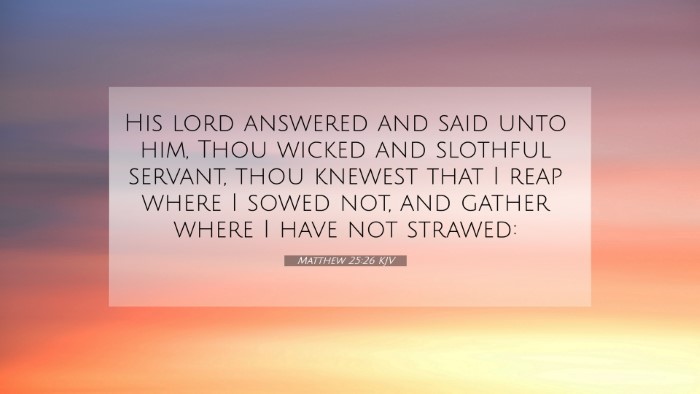Understanding Matthew 25:26
Matthew 25:26 presents a critical insight into the responsibilities and expectations of individuals in the kingdom of God. The verse states:
"But his lord answered and said to him, ‘You wicked and lazy servant! You knew that I reaped where I have not sown and gathered where I have not scattered seed.’"
This verse emphasizes the themes of accountability, stewardship, and the consequences of inaction.
Contextual Analysis
This verse is situated within the Parable of the Talents, where Jesus illustrates the importance of utilizing one's God-given resources. The master in the parable represents Christ, who entrusts his servants with various amounts of wealth or skills (the "talents"), symbolizing opportunities and responsibilities in life.
Commentary Insights
Matthew Henry's Commentary:
-
Accountability for Gifts: Henry points out that the servant's failure to act on the talents assigned to him reflects a general reluctance to engage with the challenges set before him.
-
The Nature of Fear: The "wicked and lazy" descriptor indicates a deeper issue of fear and misperception about his master's character. Instead of using his talent, the servant acts out of fear rather than faith, which leads to his condemnation.
Albert Barnes' Commentary:
-
Understanding Responsibility: Barnes elaborates on the concept of responsibility; where the servant understood the expectations of his master but chose to disregard them. This refusal to engage led to severe consequences.
-
Characteristics of Temptation: Barnes discusses how the description of the servant as "wicked and lazy" serves to show the internal struggle of following Christ versus succumbing to temptation and apathy.
Adam Clarke's Commentary:
-
Nature of the Reproof: Clarke reflects on the master’s rebuke and how it illustrates the severity of neglecting one's duties. It suggests that even if the servant perceived his task as daunting, he still had a duty to act.
-
The Principle of Action: Clarke emphasizes that inaction in the face of ability and opportunity is itself a sin that draws condemnation. The expectation was to work towards growth and expansion, not to remain stagnant.
Thematic Connections
Matthew 25:26 is rich with thematic connections, allowing for a comprehensive Bible cross-reference guide to better understand its implications. Key themes include:
- Accountability: Romans 14:12 - "So then, each of us will give an account of ourselves to God."
- Stewardship: 1 Peter 4:10 - "Each of you should use whatever gift you have received to serve others, as faithful stewards of God’s grace in its various forms."
- The Nature of God: Psalm 25:8 - "Good and upright is the Lord; therefore he instructs sinners in his ways."
- Living Purposefully: Ephesians 5:15-16 - "Be very careful, then, how you live—not as unwise but as wise, making the most of every opportunity because the days are evil."
- Consequences of Complacency: Luke 12:47 - "The servant who knows his master’s will and does not get ready or does not do what his master wants will be beaten with many blows."
- Faithful Service: 1 Corinthians 4:2 - "Now it is required that those who have been given a trust must prove faithful."
- Judgment of Works: 2 Corinthians 5:10 - "For we must all appear before the judgment seat of Christ, so that each of us may receive what is due us for the things done while in the body, whether good or bad."
Cross-Referencing Biblical Texts
To explore deeper, one can utilize tools for Bible cross-referencing, such as a Bible concordance or various Bible reference resources, to find inter-Biblical dialogue and connections between Matthew 25:26 and other scriptures.
- Tools for Bible Cross-Referencing
- Bible Concordance: Handy for locating specific scripture references.
- Bible Cross-Reference Guides: Helpful for tracing thematic links across books of the Bible.
- Cross-Reference Bible Study: Techniques focused on understanding scriptures in context.
Conclusion
Matthew 25:26 serves as a profound reminder of the importance of stewardship in the Christian life. By analyzing this verse alongside other scriptures, believers can better understand the stakes of inaction and the call to utilize God-given gifts. The study of inter-relational biblical verses can enhance one’s spiritual growth and comprehension of God’s word.
For those seeking a deeper understanding of Bible verses and their connections, employing cross-referencing techniques will open doors to insights that reinforce and illuminate the teachings of the Bible.




